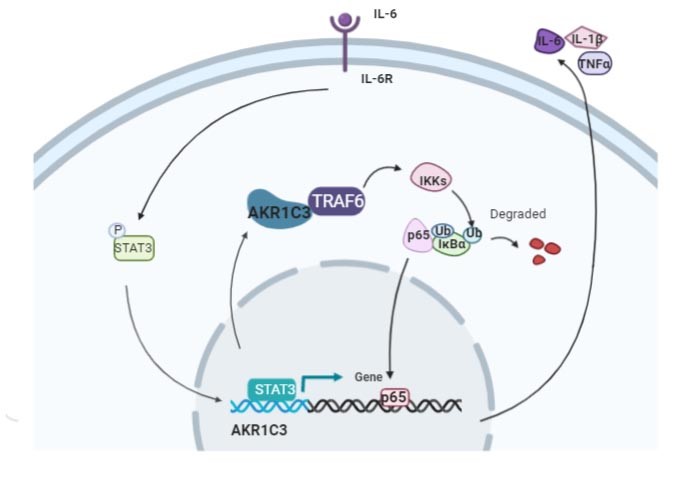
Research Progress
Tian Hua research team from SCI uncovered the molecular mechanism of AKR1C3 facilitating proliferation and metastasis in HCC in Cancer Research
Date:2020-12-31
Recently, a research paper authored by Tian Hua research team from Shanghai Cancer Institute (SCI) with the title of “A positive feedback loop of AKR1C3-mediated activation of NF-κB and STAT3 facilitates proliferation and metastasis in hepatocellular carcinoma” was published in the internationally famous oncological journal Cancer Research online. The present study elucidated a novel mechanism of aldo-keto reductase family 1 member C3 (AKR1C3) in the proliferation and metastasis in hepatocellular carcinoma (HCC), providing new potential prognostic and therapeutic targets for this disease.

In this study, it was found that AKR1C3, a member of the AKR family, was significantly upregulated in HCC tissues, and the patients with increased AKR1C3 had a poor prognosis. It was proven through in vivo and in vitro experiments that AKR1C3 obviously promoted the proliferation and metastasis of HCC cells. According to the findings of the present study, AKR1C3 interacted with TRAF6 to affect the activation of nuclear factor kappa B (NF-κB) signaling pathway, thereby causing the release of inflammatory factors [interleukin (IL)-6, IL-1β, and tumor necrosis factor (TNF)-α] by HCC cells and accelerating macrophage infiltration and the proliferation and metastasis of HCC cells. Further study results showed that the released inflammatory factors activated the downstream signal transducer and activator of transcription 3 (STAT3) signaling pathway, and the activated STAT3 directly bound to the promoter region of AKR1C3 gene and promoted its expression. Therefore, an AKR1C3/NF-κB/STAT3 positive feedback loop was formed to promote HCC cell proliferation and metastasis. The in vivo and in vitro experiments further confirmed that the AKR1C3 inhibitors indocin and medroxyprogesterone acetate significantly inhibited the proliferation and invasion of HCC cells. These findings of the present study elucidate a novel signaling loop where AKR1C3 regulates the proliferation and metastasis of HCC cells, providing potential molecular targets for the prognosis judgment and treatment of HCC.
Zhou Qingqing, a master student graduating in 2020, Tian Wei, an intern researcher, Jiang Zhiyuan, a master student graduating in 2019 and Huang Tingting, a master student are the co-first authors of this paper, and the corresponding author is Tian Hua, an associate researcher. Researcher Li Jinjun also made important contributions to this paper.
